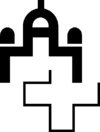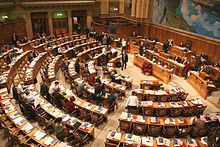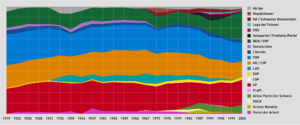- National Council of Switzerland
-
National Council of Switzerland
German: Nationalrat
French: Conseil National
Italian: Consiglio Nazionale
Romansh: Cussegl Naziunal
Type Type lower house Members 200 Meeting place 
Website www.parliament.ch The National Council of Switzerland (German: Nationalrat, French: Conseil National, Italian: Consiglio Nazionale, Romansh: Cussegl Naziunal) is the lower house of the Federal Assembly of Switzerland. With 200 seats, it is the larger of the two houses.
The National Council is elected by Swiss adult citizens, as is most of the Swiss Council of States. There were 4.6 million citizens old enough to vote in 2003. Members, called 'National Councillors', serve for four-year terms.
Each of the 26 cantons is a constituency. The number of deputies of each constituency depends on the population of the canton. Zürich, which is the most-populous canton, has 34 seats; Uri, Glarus, Obwalden, Nidwalden, Appenzell Ausserrhoden, and Appenzell Innerrhoden, each have only one seat.[1] For cantons with more than one seat, proportional representation is used.
Contents
2011 election
Main article: Swiss federal election, 2011Switzerland 
This article is part of the series:
Politics and government of
SwitzerlandSubdivisions
The 2011 election to the National Council resulted in a strengthening of the political center, reversing the trend towards polarisation in Swiss politics during the 1990s and 2000s, the centrist parties gaining an overall of about 7% of the popular vote, with the right pole losing 3.6% and the left pole losing 3.5%. Voter turnout was 48.6%, compared to 48.9% in 2007.
Summary of the 23 October 2011 National Council of Switzerland election results Parties Abbr. Alignment Ideology Votes[2] % +/– Seats +/– Swiss People's Party SVP/UDC Right-wing National conservatism 641,106 26.6 −2.4 54 −8 Social Democratic Party SPS/PSS Left-wing Social democracy 450,693 18.7 −0.9 46 +3 FDP.The Liberals FDP/PLR Centre-right Classical liberalism 364,704 15.1 −2.5 30 −5 Christian Democratic People's Party CVP/PDC Centre Christian democracy 296,350 12.3 −2.2 28[3] −3 Green Party GPS/PES Left-wing Green politics 203,447 8.4 −1.2 15 −5 Green Liberal Party GLP/PVL Centre Green liberalism 130,041 5.4 +4.0 12 +9 Conservative Democratic Party BDP/PBD Centre-right Conservatism / economic liberalism 130,878 5.4 New 9 New Evangelical People's Party EVP/PEV Centre Christian democracy 48,259 2.0 −0.4 2 ±0 Ticino League LdT Right-wing Regionalism / Right-wing populism 18,956 0.8 +0.2 2 +1 Christian Social Party CSP/PCS Left-wing Christian left 15,312 0.6 +0.2 1[4] ±0 Geneva Citizens' Movement MCG Right-wing Regionalism / Right-wing populism 10,555 0.4 +0.3 1 +1 Federal Democratic Union EDU/UDF Right-wing Christian right 30,340 1.3 ±0 0 −1 Left (Alternative Left, Party of Labour, solidarités) LIN/GAU Far-left Socialism / communism 28,861 1.2 −0.1 0 −1 Other 40,623 1.7 0 ±0 Total (turnout 49.1%) 2,410,125 — — 200 — Source: Federal Chancellery, Swiss Broadcasting DRS (German) 2007 election
Main article: Swiss federal election, 2007The 2007 election to the National Council saw the Swiss People's Party strengthen its position as the largest party, gaining seven seats to put it on 62. In second place, the Social Democratic Party lost nine seats, giving it 43. The Free Democratic Party and Christian Democratic People's Party tied for third place with 31 seats each, having lost five seats and gained three seats respectively. The Green Party broke into the main group of parties, increasing its number of seats by seven to leave it on 20 after the election.
Summary of the 21 October 2007 National Council of Switzerland election results Parties Abbr. Ideology Votes % +/– Seats +/– Swiss People's Party SVP/UDC National conservatism 672,562 28.9 +2.2 62 +7 Social Democratic Party SPS/PSS Social democracy 451,916 19.5 –3.8 43 –9 Free Democratic Party FDP/PLR Classical liberalism, Radicalism 364,736 15.8 –1.3 31 –5 Christian Democratic People's Party CVP/PDC Christian democracy 335,623 14.5 +0.1 31 +3 Green Party GPS/PES Green politics 222,206 9.6 +2.2 20 +7 Liberal Party LPS/PLS Classical liberalism 41,682 1.9 –0.3 4 ±0 Green Liberal Party GLP/PVL Green liberalism 33,104 1.4 N/A 3 N/A Evangelical People's Party EVP/PEV Christian democracy 56,748 2.4 +0.1 2 –1 Federal Democratic Union EDU/UDF Christian right 29,914 1.3 ±0.0 1 –1 Party of Labour PdA/PST-POP Communism 17,218 0.7 ±0.0 1 –1 Ticino League LdT National conservatism 13,031 0.6 +0.2 1 ±0 Christian Social Party CSP/PCS Christian left 9,984 0.4 ±0.0 1 ±0 Swiss Democrats SD/DS Nationalism 12,609 0.5 –0.5 0 –1 solidaritéS Sol Socialism 8,669 0.4 –0.1 0 –1 Alternative List AL Socialism 4,582 0.2 –0.3 0 ±0 Others 43,327 1.8 +0.2 0 ±0 Total (turnout 48.9%) 2,317,911 — — 200 — Source: http://www.politik-stat.ch/nrw2007CH_de.html Committees
- Foreign Affairs Committee (FAC)
- Committee for Science, Education and Culture (CSEC)
- Committee for Social Security and Health (CSSH)
- Committee for the Environment, Spatial Planning and Energy (CESPE)
- Defence Committee (DefC)
- Committee for Transportation and Telecommunications (CTT)
- Committee for Economic Affairs and Taxation (CEAT)
- Political Institutions Committees (PIC)
- Committee for Legal Affairs (CLA)
- Committee for Public Buildings (CPB)
Supervisory committees
- Finance Committee (FC)
- Control Committees (CC)
- Parliamentary investigation committees (PIC)
Other committees
- Committee on Pardons
- Rehabilitation Committee
- Drafting Committee
- Judicial Committee
Lists
- Presidents of the National Council of Switzerland.
- List of members of the Swiss National Council (2007-2011)
- List of members of the Swiss National Council (2003-2007)
Members per canton
Abbr Canton Number of Seats ZH Zurich 34 BE Bern 26 LU Lucerne 10 UR Uri 1 SZ Schwyz 4 OW Obwalden (Obwald) 1 NW Nidwalden (Nidwald) 1 GL Glarus 1 ZG Zug 3 FR Fribourg 7 SO Solothurn 7 BS Basel-Stadt (Basel-City) 5 BL Basel-Landschaft (Basel-Country) 7 SH Schaffhausen 2 AR Appenzell Ausserrhoden (Appenzell Outer Rhodes) 1 AI Appenzell Innerrhoden (Appenzell Inner Rhodes) 1 SG St. Gallen (St. Gall) 12 GR Graubünden (Grisons) 5 AG Aargau (Argovia) 15 TG Thurgau (Thurgovia) 6 TI Ticino 8 VD Vaud 18 VS Valais (Wallis) 7 NE Neuchâtel 5 GE Geneva 11 JU Jura 2 Footnotes
- ^ http://www.parlament.ch/homepage/ra-nr-nationalrat/ra-nr-nationalrat-mitglieder-prokanton.htm
- ^ The official results are listed by canton. These numbers are a summary of the 26 separate tables of cantonal results. See German-language Wikipedia for details.
- ^ One seat for Ticino goes to either Duca Widmer Monica or Romano Marco, both of whom received the exact same number of 23,979 votes. It is yet to be decided (as of 25 October) which candidate will receive the seat.
- ^ Karl Vogler of Obwalden, declared his intention to join the Christian Democratic parliamentary group.
Categories:- National Council of Switzerland
- National lower houses
Wikimedia Foundation. 2010.

